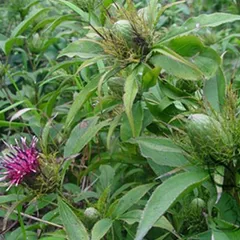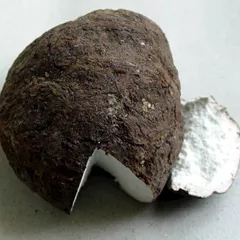Qi Deficiency
The information provided here is not a replacement for a doctor. You shouldn't use it for the purpose of self-diagnosing or self-medicating but rather so you can have a more informed discussion with a professional TCM practitioner.
At a glance
Preliminary reading: What is a pattern? The concept of Qi The concept of Deficiency
Key attributes
Chinese name: 气虚 Pinyin name: Qì Xū
Pattern nature: Empty
Pattern hierarchy: General pattern with specific forms like Kidney Qi not Firm or Spleen Qi Deficiency
Common combinations: Qi and Blood Deficiency Wind-Cold-Damp invading with Qi Deficiency
Causes
Precursor patterns: Phlegm Misting the Heart Spleen not controlling Blood
Common causes: 1. Weak constitution, 2. Overwork, 3. Chronic diseases
Diagnosis
Common symptoms: Fatigue Weak voice Listlessness Loose stools Poor appetite and five other symptoms
Pulse type(s): Empty (Xu), Weak (Ruo)
Tongue description: Pale tongue
Treatment
Treatment principle: Tonify general body and Organs
Common formulas: Si Jun Zi Tang Liu Jun Zi Tang
Pathology
When Qi is Deficient, it typically appears as tiredness or weakness in the body. Since Qi is lacking, it is unable to perform any of its functions. Some of the symptoms for Qi Deficiency also commonly apply for other conditions.
This may apply to any of the different types of Qi, including the Qi in Organs. For instance, if Defensive Qi is insufficient, the person may be prone to frequent colds and flu and spontaneous sweating. If Spleen Qi is Deficient, the Uterus or Bladder may prolapse or the appetite may be poor and digestion sluggish. Kidneys Qi Deficiency may cause poor Body Fluids regulation and thus leads to edema, frequent urination or incontinence.
The most common types of Qi Deficiency are Lungs and Spleen Qi Deficiencies. This is because the Lungs 'govern Qi' and the Spleen is the source of Qi through its activity of transformation and transportation. Heart or Kidneys Qi Deficiency is also fairly common.
Causes
Precursor patterns: Qi Deficiency can derive from Phlegm Misting the Heart Spleen not controlling Blood
Weak constitution : If patients have some inherited conditions, they are prone to have weaker constitutions then others. This can be a cause of general Qi Deficiency.
Overwork : Prolonged working without proper rest can consume general body Qi.
Chronic diseases: Long term sickness consumes general body Qi.
Diagnosing Qi Deficiency
Diagnosing a pattern in Chinese Medicine is no easy feat and should be left to professional practitioners. In particular one has to know how to differentiate between different types of pulses and tongue coatings, shapes and colors as well as learn to read from a long list of seemingly unrelated symptoms.
Pulse type(s): Empty (Xu) or weak (Ruo)
Tongue description: Pale tongue
Main symptoms: Fatigue Weak voice Listlessness Loose stools Poor appetite General weakness Aversion to speak Shortness of breath Spontaneous sweating Frequent Colds or Flu
Diagnosis commentary: Key characteristic symptoms of this pattern are the general weakness and fatigue.
Treating Qi Deficiency
Treatment principle
Tonify general body and Organs
Herbal formulas used to treat Qi Deficiency



The top herbs in Si Jun Zi Tang are Ginseng (Ren Shen), Atractylodes Rhizomes (Bai Zhu) and Poria-Cocos Mushrooms (Fu Ling)
Si Jun Zi Tang
Source date: 1107 AD
Number of ingredients: 4 herbs
Key actions: Tonifies Qi. Strengthens the Spleen and Stomach.
Formula summary
Si Jun Zi Tang is a 4-ingredient Chinese Medicine formula. Invented in 1107 AD, it belongs to the category of formulas that tonify Qi.
Besides Qi Deficiency, Si Jun Zi Tang is also used to treat Stomach Qi Deficiency or Spleen and Lung Qi Deficiency.



The top herbs in Liu Jun Zi Tang are Ginseng (Ren Shen), Atractylodes Rhizomes (Bai Zhu) and Tangerine Peel (Chen Pi)
Liu Jun Zi Tang
Source date: 1107
Number of ingredients: 6 herbs
Key actions: Tonifies Qi. Strengthens the Spleen and Stomach. Clears Phlegm and mucus. Promotes appetite.
Formula summary
Liu Jun Zi Tang is a 6-ingredient Chinese Medicine formula. Invented in 1107, it belongs to the category of formulas that tonify Qi.
Besides Qi Deficiency, Liu Jun Zi Tang is also used to treat Spleen and Lung Qi Deficiency or Phlegm.
Diet recommendations
Balance diets and try these foods that rich in nutrition but also easy to digest such as rise, meat, fish, shrimps. Avoid cold, raw, spicy or greasy foods.
Special highlight: the link between abnormal uterine bleeding and Qi Deficiency

Milkvetch Roots (Huang Qi) is the key herb for Bu Zhong Yi Qi Tang, a formula used for abnormal uterine bleeding caused by Qi Deficiency
Typical symptoms for abnormal uterine bleeding caused by Qi Deficiency: Fatigue Dizziness Cold limbs Low energy Weak knees Palpitations Loose stools Poor appetite Weak lower back Pale color periods Thin and watery periods
Recommended herbal formulas: Bu Zhong Yi Qi Tang, Gui Pi Tang, Gu Ben Zhi Beng Tang
The pathology of abnormal uterine bleeding is a bit similar to that of spontaneous flow of breast milk. A key cause is that Qi is not strong enough to hold Body Fluids - be they breast milk or menstruation blood - so the Fluids flow out unwantedly. Since this is an Deficient type of bleeding, it is characterized by flooding at the beginning of the period, which then stops and continues with dripping after the periods end. A pale red blood color is a typical symptom.
The Spleen is the major...Read more about abnormal uterine bleeding
Special highlight: the link between heavy menstruation and Qi Deficiency

Milkvetch Roots (Huang Qi) is the key herb for Bu Zhong Yi Qi Tang, a formula used for heavy menstruation caused by Qi Deficiency
Typical symptoms for heavy menstruation caused by Qi Deficiency: Tiredness Weak Limbs Palpitations Shortness of breath Pale menstrual blood Thin and watery periods
Recommended herbal formulas: Bu Zhong Yi Qi Tang, Gui Pi Tang, Ju Yuan Jian
Qi Deficiency is a key cause of heavy menstruation and abnormal uterine bleeding. The way it works is that Qi is not firm enough to hold Blood in the vessels and it therefore flows out unwantedly. The Directing and Penetrating Vessels are also too weak to contain Blood.
The Spleen is the major Organ involved in this pattern because its role is to 'transform and transport' food and drinks, extracting Grain Qi (Gu Qi) out of them, and distributing it to other Organs and Blood vessels....Read more about heavy menstruation
Consequence patterns
When the Qi get Deficient for a long time without being adjusted, Qi collapses or sinks.
The Deficient Qi fails to support the normal Qi circulation and thus the Stagnation pattern.
When Qi is Deficient for a long period of time, it fails to move Blood and hence the Blood Stagnation pattern.
The Deficient Qi is so weak that it fails to hold Blood in the vessels. Then the Blood get pushed out by the Blood Heat.
Qi is a Yang element which warm the body. When Qi is weak over a long period of time, it develops to more severe stage of Yang Deficiency.
